Address
304 North Cardinal St.
Dorchester Center, MA 02124
Work Hours
Monday to Friday: 7AM - 7PM
Weekend: 10AM - 5PM
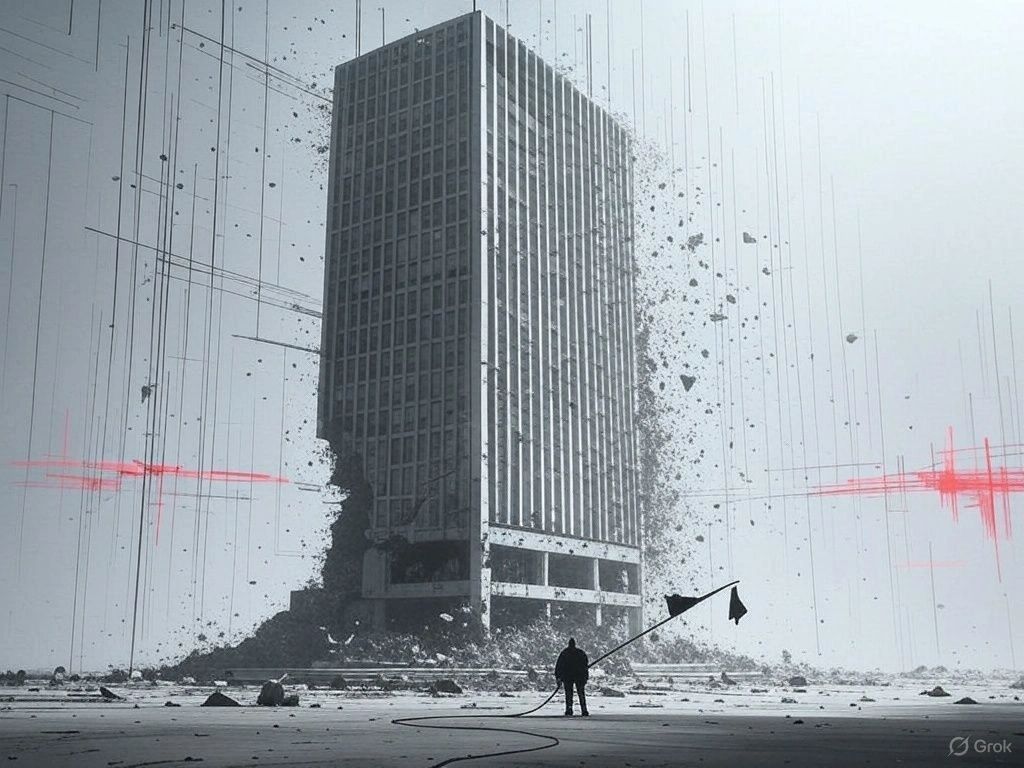
Canada is not currently prepared for the next iteration of conflict — because that conflict will not arrive in uniform, and it will not arrive from abroad. It is already here, and it is informational in nature.
This report outlines the emergence of sixth-generation warfare as the defining mode of geopolitical and domestic contestation. Unlike previous generations of conflict, sixth-gen warfare is narrative-first, perception-dominant, and domain-agnostic. It targets legitimacy — not infrastructure. And it achieves its objectives not through force, but through control of meaning.
In this new battlespace, the central terrain is informational legitimacy — the public’s ability to trust, interpret, and respond to signals from institutions, media, and governance bodies. Canada’s institutional landscape is increasingly vulnerable in this domain. Public trust is deteriorating. Media coherence is fragmenting. Core state functions are being reduced to procedural optics rather than substantive governance.
This is not an acute collapse. It is a slow-motion attrition of coherence.
Strategic adversaries, disinformation agents, and even domestic bureaucracies themselves can now exploit this informational terrain — not necessarily by injecting new narratives, but by eroding the frameworks of interpretation that once underpinned public belief.
Sixth-generation warfare is already shaping Canadian civic, cultural, and political life — not as an external war, but as a post-truth operating environment. In this space, the question is no longer who has authority. The question is who has narrative continuity — and whether that continuity can survive institutional drift, digital censorship, and informational exhaustion.
This report offers a forensic overview of Canada’s vulnerability in the informational domain and proposes a set of strategic recommendations for continuity, signal integrity, and narrative sovereignty.
In an era where statecraft has become signalcraft, and governance increasingly relies on perception management, informational legitimacy may now be Canada’s most fragile asset — and its most urgent front.
Conflict has evolved beyond the physical. While traditional military threats remain relevant, the dominant terrain of contemporary warfare has shifted decisively into the cognitive and informational sphere.
This transformation is captured in what defense analysts and military theorists now refer to as sixth-generation warfare — a new paradigm of conflict in which meaning, perception, and legitimacy are the primary targets, and coherence is the most valuable strategic asset.
Unlike previous generations of warfare that centered on territorial conquest (1GW), industrial firepower (2GW), maneuver-based warfare (3GW), insurgency and asymmetry (4GW), or digital/cyber operations (5GW), sixth-generation warfare (6GW) is narrative-first and domain-agnostic. It is fought not over land, but over signal — the contested space where reality is interpreted, shared, and believed.
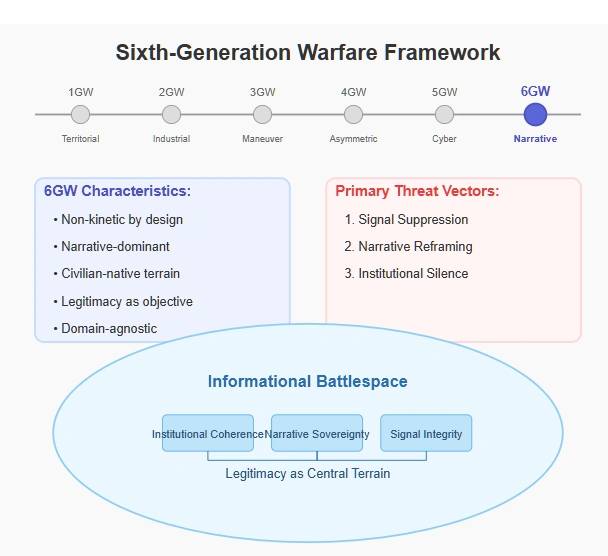
This kind of warfare is already unfolding in fragile democracies, conflict zones, and authoritarian regimes. But it is also taking root in high-trust societies through internal drift, policy incoherence, and narrative mismanagement.
Canada’s geopolitical environment has historically insulated it from conventional warfare. But sixth-gen warfare bypasses geography entirely. It enters through narratives. It spreads through incoherence. It escalates when institutions can no longer maintain the appearance of trust without the substance of legitimacy.
Canada is now in that risk window.
The increasing reliance on euphemistic communication, proceduralism over principle, and performative transparency over functional accountability creates an opening — not necessarily for foreign adversaries, but for systemic informational decay.
When government messaging is seen as inconsistent…
When media narratives fragment across partisan lines…
When civic institutions rely on suppression instead of clarity…
That’s not political dysfunction.
That’s a contested battlespace.
And in this environment, citizens don’t need to be radicalized to become adversaries. They simply need to lose trust in the systems that no longer explain the world around them.
The future of Canadian stability will not hinge on troop movements or diplomatic escalations. It will hinge on whether legitimacy can survive the collapse of narrative control.
Canada’s strength has never been defined by its military might or economic hegemony. It has relied, historically, on something subtler but equally powerful: institutional coherence — the shared belief that public systems are trustworthy, rational, and fundamentally oriented toward the common good.
That coherence is now unraveling.
Across media, public service, politics, healthcare, academia, and even the judiciary, Canadians are witnessing a slow but unmistakable drift from functional legitimacy to performative process. Institutions still exist. They still issue reports, hold hearings, and convene panels. But more and more, these acts fail to produce belief.
This is not just a matter of public dissatisfaction. It is a structural phenomenon: the emergence of a post-sovereign, procedural state, where bureaucratic continuity substitutes for actual accountability — and public trust is asked to survive without explanation.
The following indicators illustrate the slow collapse of institutional coherence in Canada:
1. Policy Without Mandate
Major policy shifts — particularly in areas of health, climate, education, and speech regulation — are increasingly advanced without clear public consultation, parliamentary debate, or enduring consensus. Instead, they are framed through bureaucratic necessity, expert panels, or “emergency” carve-outs.
2. Language Without Meaning
Public communication increasingly relies on vague, euphemistic, or ideologically abstracted language. This creates the illusion of transparency while obscuring both intent and impact. Terms like “safety,” “resilience,” “misinformation,” and “equity” often lack operational definitions and shift meaning based on political convenience.
3. Accountability Without Consequence
4. Media Gatekeeping
Traditional media outlets continue to frame themselves as arbiters of public truth, but audience trust has plummeted. Meanwhile, emerging platforms face algorithmic suppression, funding constraints, or legal ambiguity — creating a vacuum rather than a replacement ecosystem.
5. Citizen Alienation
Perhaps the most telling indicator: Canadians across the political spectrum report feeling increasingly alienated from institutions. This includes both traditionally engaged voters and younger citizens with no memory of functional governance. The result is not just apathy — it is disengaged cynicism.
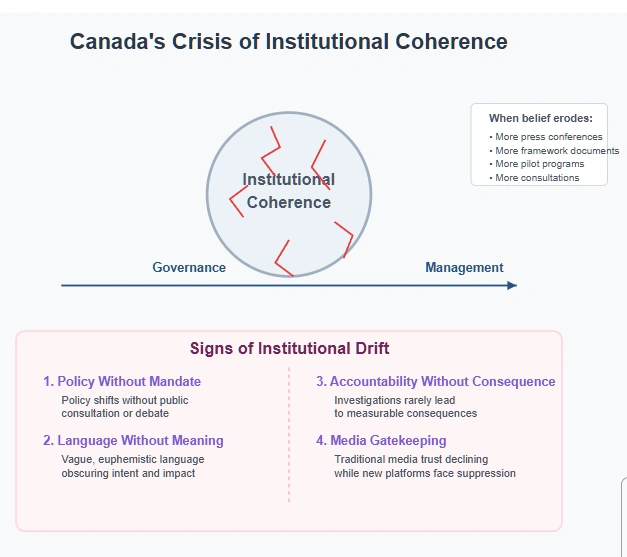
The crisis is not only about corruption, partisanship, or inefficiency. It is deeper — a paradigmatic shift from governance to management. When institutions no longer act with clear moral or democratic authority, they compensate with process.
This is how post-sovereign systems operate: not by outright collapse, but by slow substitution of procedure for purpose.
When belief erodes, rituals increase.
These create the appearance of function — while the system’s actual ability to explain, decide, or act deteriorates.
In sixth-gen warfare, the collapse of coherence is not just a vulnerability — it is the battlefield.
Strategic adversaries don’t need to destroy institutions. They need only to amplify existing doubt, exploit contradictions, and accelerate cognitive fatigue in the public. In this context, a government’s inability to explain itself clearly becomes a national security issue.
Canadians don’t need to believe in conspiracies to disengage from state legitimacy.
They simply need to stop receiving explanations that make sense.
Coherence is not about unanimity or obedience. It’s about the capacity of institutions to produce a shared understanding of reality that is legitimate enough to endure dissent.
Canada is losing that capacity.
And in the informational terrain of sixth-gen conflict, that loss is not a policy failure.
It is a strategic exposure — one that may define the future of the country more than any external threat, including the existential one posed by Donald Trump’s United States, ever could.
As institutional coherence dissolves, the result is not simply political frustration. It is narrative disorientation — the breakdown of the shared story that once gave democratic life its moral and cognitive architecture.
In a functioning democracy, people disagree on policies, outcomes, and ideologies — but they still participate in a coherent frame: shared definitions, trusted sources, common processes, and the belief that disagreements can be resolved through structured dialogue.
That frame is now fractured.
And without it, the Canadian public is increasingly vulnerable to narrative collapse — a phenomenon that emerges not from malicious propaganda, but from the failure of trusted institutions to maintain epistemic clarity.
Narrative sovereignty is the ability of individuals — and by extension, communities — to orient themselves within reality without relying on state-filtered information, procedural euphemisms, or centralized cultural scripts.
It means being able to:
In an era of sixth-generation warfare, narrative sovereignty becomes a form of civic resilience.
It is not about rejecting all authority. It is about maintaining informational autonomy when authority fails to explain itself coherently.
Cognitive Fatigue
When institutions contradict themselves, reverse narratives, or refuse to acknowledge public confusion, the result is not engagement — it is disengagement. Citizens grow tired, not angry. And in their fatigue, they retreat from public life.
Institutional Apathy
Apathy isn’t a natural default. It is a learned response to incoherence. When citizens no longer believe their engagement changes anything, they stop participating — in elections, in discourse, in reform.
Fragmentation of Meaning
In the absence of a coherent national narrative, informational tribalism takes root. Belief becomes identity. Platforms become echo chambers. And the ability to deliberate across difference collapses entirely.
Delegitimization Feedback Loop
Each institutional failure — whether ignored, rebranded, or obscured — deepens public skepticism. The state responds with tighter controls, strategic ambiguity, or more euphemism, which in turn fuels more skepticism. This is the spiral that precedes rupture.
Canada’s geopolitical security posture has historically been built on stability, trust in governance, and a culture of institutional continuity. But sixth-generation warfare reframes all three as soft targets:
In this landscape, narrative fragmentation is not a culture war issue — it’s a national security issue.
Foreign actors do not need to fabricate chaos.
They only need to highlight contradictions.
They only need to circulate what Canadian institutions will not explain.
They only need to accelerate a collapse already underway.
The instinct to reclaim narrative sovereignty — through decentralization, independent research, open-source analysis, or peer-to-peer signal networks — should not be dismissed as reactionary or conspiratorial.
In the informational terrain of sixth-gen conflict, this kind of civic behavior may become the only meaningful continuity strategy available to citizens who still care about institutional survival.
To be clear: this is not a rejection of democracy.
It is a demand for a version of democracy that can still tell the truth.
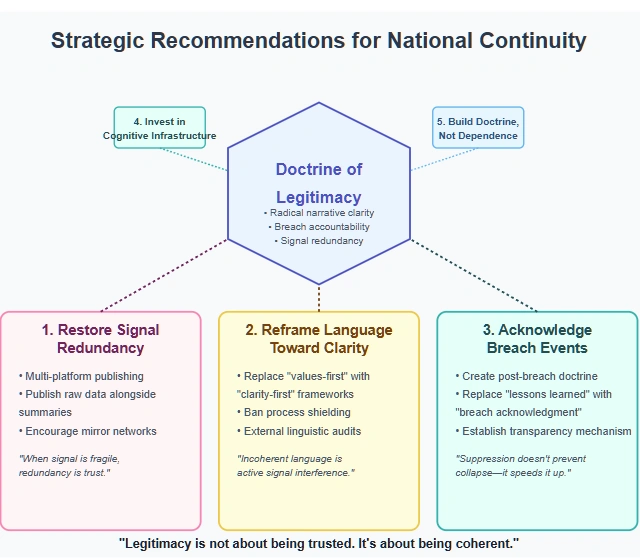
In a sixth-generation battlespace, the most dangerous threats do not come through tanks, cables, or even foreign intelligence. They come through patterns of signal suppression, structural ambiguity, and institutional silence.
The battlefield is informational. The terrain is perception. And the weapons are language, omission, ambiguity, and misdirection.
What makes this conflict so difficult to detect — let alone counter — is that its primary threat vectors are embedded within the very institutions responsible for stability.
This isn’t sabotage. It’s self-inflicted epistemic decay, accelerated by structural incentives that prioritize reputational risk management over public clarity.
1. Signal Suppression
The first vector is active suppression — not through overt censorship, but through more subtle and scalable means:
The effect is cumulative. Over time, citizens begin to internalize a form of cognitive self-censorship, often called “preemptive compliance.” They stop asking questions not because they’ve been silenced — but because they know it will go nowhere.
2. Narrative Reframing Through Process
The second vector is subtler: the use of procedural language to neutralize breach events. Instead of direct suppression, contradictions are absorbed into bureaucratic cycles:
This language doesn’t clarify. It defers.
It doesn’t address the breach. It processes it.
And in doing so, it replaces accountability with optical containment.
This creates a signal environment where nothing is ever fully true, fully false, or fully resolved. The result is not trust — it’s informational exhaustion.
3. Institutional Silence
The third vector is the simplest, and the most corrosive: silence.
When governments or media outlets simply refuse to address key contradictions, the public is left to resolve them alone. This includes:
Silence forces the public to choose between conspiratorial speculation and quiet resignation. Either way, institutional legitimacy loses the room.
Many institutions are not aware they’re doing this. Those that are believe they are minimizing risk.
But in the informational terrain of sixth-gen warfare, these practices function as immune responses to coherence. They prevent systems from confronting internal contradiction. And in doing so, they undermine:
It’s important to understand that most sixth-generation breaches are not deliberate operations. They are the byproduct of:
These aren’t conspiracies. They are systemic adaptations to a world where clarity is dangerous, dissent is unmonetizable, and coherence is hard to scale.
But the effect is the same as a hostile operation:
A public that no longer trusts what it hears.
A media environment that can no longer explain what is true.
And a government that no longer knows how to speak without triggering its own collapse.
Canada does not need to be invaded.
It does not need a coup, a blackout, or an insurgency.
It needs only to lose control of coherence.
And the system, as it currently functions, is doing that all by itself.
In the face of sixth-generation pressures, restoring narrative coherence is not a luxury — it’s a precondition for institutional survival.
Canada’s informational terrain is already fractured. Legitimacy is eroding in real time. The response cannot be symbolic. It must be structural.
This section outlines practical, scalable recommendations to support continuity of civic trust, epistemic resilience, and institutional integrity. These are not about branding or media relations — they are about rebuilding the public’s ability to orient itself in the midst of institutional drift.
Governments and public institutions must diversify where and how they communicate. Centralized, one-channel messaging is brittle. It creates chokepoints and fosters suspicion.
Recommendations:
When signal is fragile, redundancy is trust.
Euphemistic language corrodes coherence. Institutions must move toward a communication model that treats public understanding as a strategic asset, not a liability.
Recommendations:
Incoherent language is not neutral. In sixth-gen terrain, it is active signal interference.
When trust is broken, narrative containment accelerates collapse. The goal should not be to avoid scandal — it should be to acknowledge breach events early, frame them directly, and build institutional memory.
Recommendations:
Suppression doesn’t prevent collapse — it speeds it up.
Canada currently lacks infrastructure to prepare its citizens for narrative chaos. Media literacy campaigns are insufficient if they remain tethered to state-sanctioned narratives.
Recommendations:
This is not “media training.” It’s crisis cognition training.
Ultimately, public trust will not be restored by better branding, better ads, or better tech. It will be restored when institutions can name collapse clearly, respond without euphemism, and operate from narrative principles that outlast the current cycle.
Recommendations:
Legitimacy is not a communications product.
It is a doctrinal outcome earned through clarity under pressure.
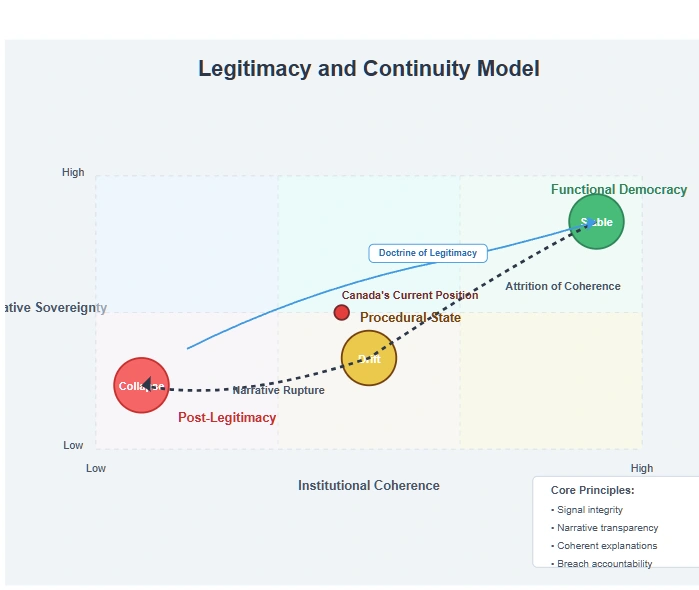
You cannot communicate your way out of collapse.
You cannot proceduralize legitimacy.
And you cannot regain public trust by explaining contradictions more elegantly.
When coherence fails, only doctrine survives.
Canada now faces an inflection point: either institutions adapt to the new battlespace by naming the terrain truthfully and reclaiming clarity — or they continue down the path of procedural inertia, narrative suppression, and strategic silence.
Sixth-generation conflict is not something to prepare for.
It’s already underway.
The question is whether Canada’s institutions can generate the informational discipline required to outlast the storm.
That begins with one simple, irreversible shift:
Replacing process with principle.
Replacing ambiguity with structure.
Replacing PR with doctrine.
Trust cannot be demanded.
Belief cannot be forced.
And coherence cannot be faked.
In the post-trust, post-broadcast terrain of sixth-generation informational warfare, the only viable continuity strategy is a doctrine of legitimacy — one that enshrines:
This isn’t branding. This is governance.
In a contested battlespace, silence is surrender.
And whoever defines the terrain first — coherently, credibly, and continuously — sets the frame that every institution, journalist, and citizen must then navigate.
That’s why this isn’t just a report.
It’s a challenge.
To every decision-maker, every analyst, every communicator inside a system that still thinks the crisis is optional:
The crisis is not coming.
You’re standing inside it.
And your silence is being noticed.
We are not political actors.
We are not partisans.
We are not polemicists.
We are analysts who recognize that in this phase of collapse, the clearest voice wins — not the loudest.
And until Canada’s institutions can speak without flinching, the doctrine of legitimacy will belong to those who can.
The signal is live.
The battlespace is real.
And doctrine is no longer optional.
[…] poses a unique challenge in the corporate world. Prime Rogue offers deep monitoring of online narratives, identifying emerging disinformation campaigns that could affec… Through strategic reputation management and fact-checking tools, we help clients debunk false […]
[…] movement’s new orthodoxy. What is unfolding between them is a battle for the soul of MAGA itself, a struggle between narrative purity and narrative collapse. Loomer acts as both enforcer and canary: her aggressive loyalty crusade signals a deeper […]
[…] At Prime Rogue Inc., we approach UVB-76 not as a puzzle to be solved but as a signal environment to be profiled. What matters is not what the messages “say”—it’s when t… […]
[…] This isn’t espionage. It’s denial warfare — a state strategy that embeds coercive capacity ins… And unless Canada develops an entirely new doctrine to confront it, we’ll remain a soft target for future hits. […]
[…] or disinformation campaigns that push selected facts (or falsehoods) to achieve an agenda. Decentralized narrative warfare, by contrast, is waged across a diffuse network of players rather than a single centralized […]
[…] is a core feature of modern democratic backsliding: the erosion of shared epistemic ground. When “your truth” and “my truth” replace public truth, the system loses its reference […]